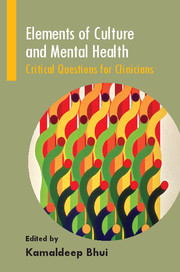Book contents
- Frontmatter
- Contents
- List of contributors
- Foreword: Desire and commitment: essential ingredients in learning about culture and mental illness
- 1 Is trauma-focused therapy helpful for survivors of war and conflict?
- 2 Will ethnopsychopharmacology lead to changes in clinical practice?
- 3 Does cognitive–behavioural therapy work for people with very different cultural orientations and backgrounds?
- 4 Can you do meaningful cognitive–behavioural therapy through an interpreter?
- 5 Are particular psychotherapeutic orientations indicated with specific ethnic minority groups?
- 6 Can psychotherapeutic interventions overcome epistemic difference?
- 7 On the role of culture and difference in evaluation, assessment and diagnosis
- 8 Necessary and sufficient competencies for intercultural work
- 9 On the validity and usefulness of existing Eurocentric diagnostic categories
- 10 Benefits and limitations of the cultural formulation in intercultural work
- 11 Barriers to the intercultural therapeutic relationship and how to overcome them
- 12 How does intercultural interpretation work in the mental health setting?
- 13 Do the power relations inherent in medical systems help or hinder in cross-cultural psychiatry?
- 14 Recovery and well-being: a paradigm for care
- 15 Social perspectives on diagnosis
- 16 Public mental health and inequalities
- 17 Can you do psychotherapy through an interpreter?
- 18 Can race and racism be acknowledged in the transference without it becoming a source of therapeutic impasse?
- 19 Cultural competence: models, measures and movements
- 20 Religion, spirituality and mental health
- Index
9 - On the validity and usefulness of existing Eurocentric diagnostic categories
Published online by Cambridge University Press: 01 January 2018
- Frontmatter
- Contents
- List of contributors
- Foreword: Desire and commitment: essential ingredients in learning about culture and mental illness
- 1 Is trauma-focused therapy helpful for survivors of war and conflict?
- 2 Will ethnopsychopharmacology lead to changes in clinical practice?
- 3 Does cognitive–behavioural therapy work for people with very different cultural orientations and backgrounds?
- 4 Can you do meaningful cognitive–behavioural therapy through an interpreter?
- 5 Are particular psychotherapeutic orientations indicated with specific ethnic minority groups?
- 6 Can psychotherapeutic interventions overcome epistemic difference?
- 7 On the role of culture and difference in evaluation, assessment and diagnosis
- 8 Necessary and sufficient competencies for intercultural work
- 9 On the validity and usefulness of existing Eurocentric diagnostic categories
- 10 Benefits and limitations of the cultural formulation in intercultural work
- 11 Barriers to the intercultural therapeutic relationship and how to overcome them
- 12 How does intercultural interpretation work in the mental health setting?
- 13 Do the power relations inherent in medical systems help or hinder in cross-cultural psychiatry?
- 14 Recovery and well-being: a paradigm for care
- 15 Social perspectives on diagnosis
- 16 Public mental health and inequalities
- 17 Can you do psychotherapy through an interpreter?
- 18 Can race and racism be acknowledged in the transference without it becoming a source of therapeutic impasse?
- 19 Cultural competence: models, measures and movements
- 20 Religion, spirituality and mental health
- Index
Summary
‘[I]t is clear that there is no classification of the Universe not being arbitrary and full of conjectures. The reason for this is very simple: we do not know what thing the universe is.’
(Borges, 1993)The principal mental health diagnostic classifications are found in the International Classification of Diseases (ICD) of the World Health Organization (www.who.int/classifications/icd/en) and the Diagnostic and Statistical Manual of Mental Disorders (DSM) of the American Psychiatric Association (www.psych.org/practice/dsm). The DSM was initially developed to create a common system of nomenclature, and the objective of subsequent iterations was the identification of maximally valid diagnostic criteria according to a specific classificatory system. Both the DSM and the ICD systems (despite the ostensible international focus of the latter) are fundamentally based in European and North American thinking (Kleinman, 1988). Western diagnostic systems can be understood in the way that structural anthropology conceptualises scientific classification: ‘classificatory schemes […] allow the natural and social universe to be grasped as an organized whole’ (Levi-Strauss, 1966: p. 135).
As a manner of observing the universe, classifications of mental disorders are necessarily immersed in a culture-specific context, which clearly complicates the possibility of their universal application (Heidegger, 2000). Growing multiculturalism demands questioning of the pertinence of these classification systems in non-Western environments. The consequences of generalising data derived from these systems is itself questionable and requires attention (Beneduce, 2006). Three epistemological positions can be distinguished in relation to the question of the validity and/or usefulness of Western diagnostic systems for individuals from non-Western cultures:
• a universally applicable approach, from which the DSM and ICD criteria were born
• a culture-specific approach, in which diagnostic criteria would be developed relative to each culture
• a classification-free approach, which questions the coherence and justification of diagnostic classifications, Western or otherwise.
Classification as universally applicable
The first approach is the most common and shared by mainstream psychiatry. The DSM represents one of the best known systems for the universalisation of psychiatric entities to other cultures (Kupfer et al, 2008; Yeung & Kam, 2008).
- Type
- Chapter
- Information
- Elements of Culture and Mental HealthCritical Questions for Clinicians, pp. 42 - 46Publisher: Royal College of PsychiatristsPrint publication year: 2013



